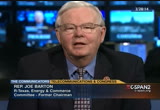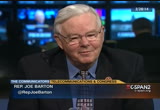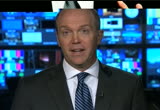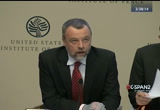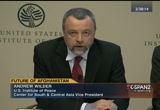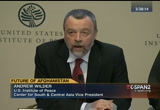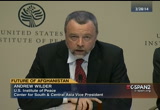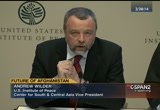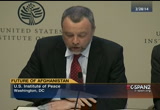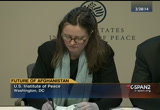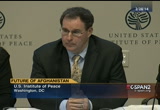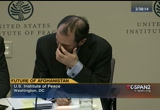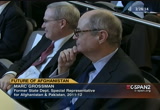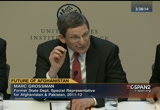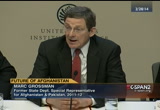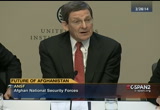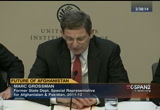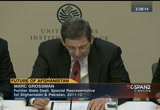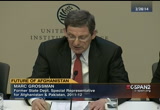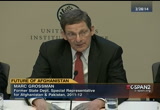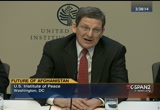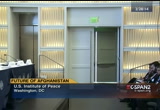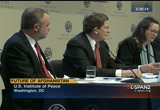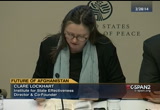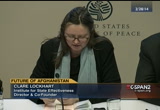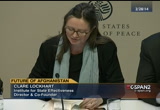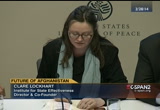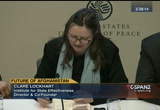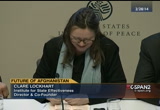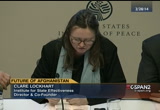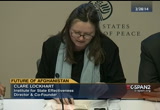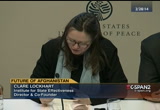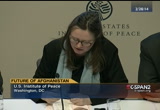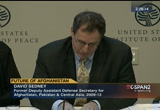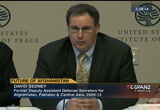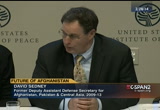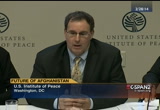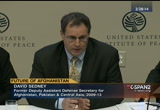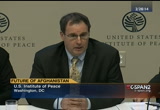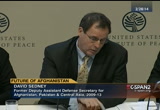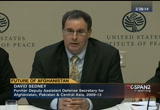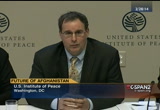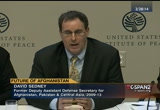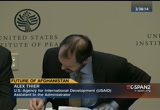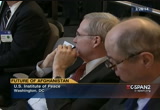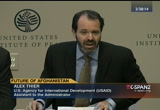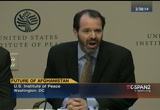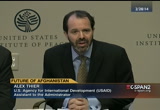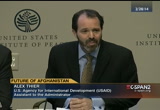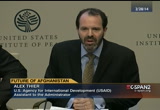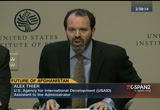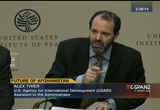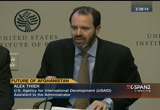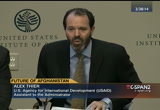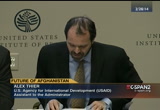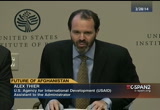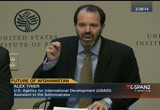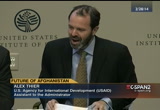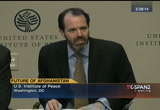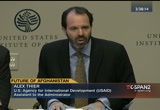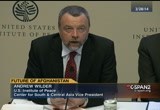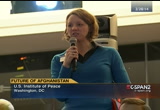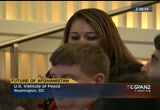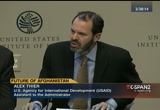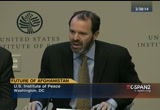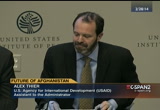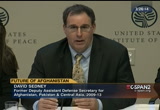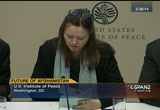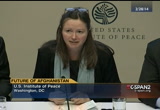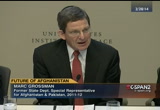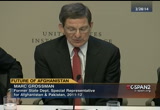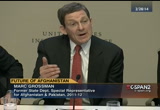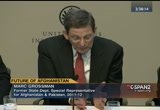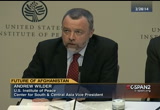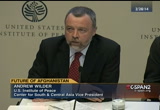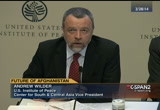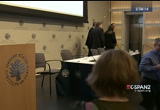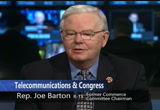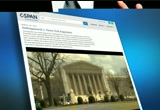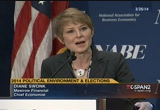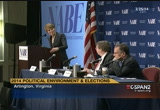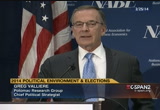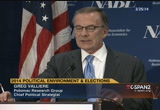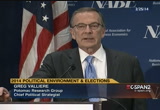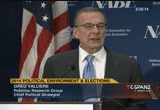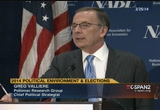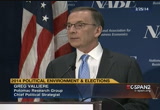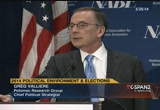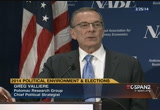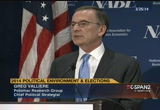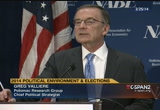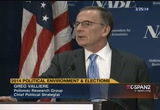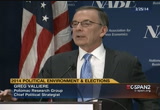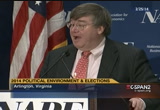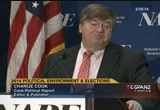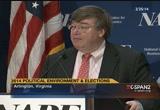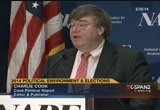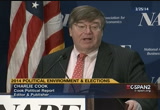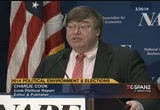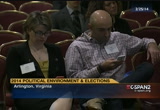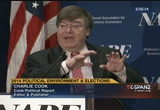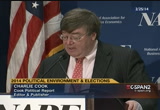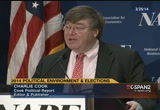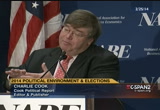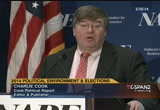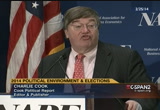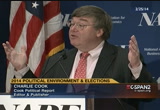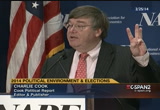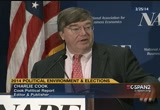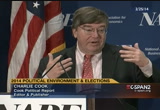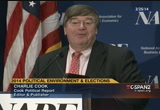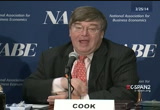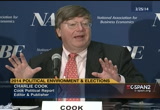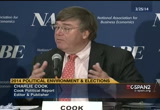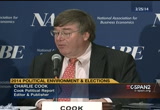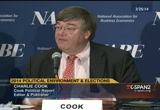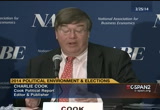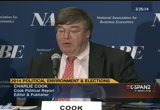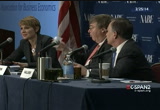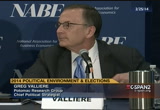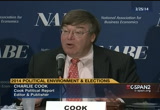tv Key Capitol Hill Hearings CSPAN March 3, 2014 8:30am-10:31am EST
8:30 am
of the interagency task forces that they were on. and so the secretary of energy asked me to do that project in the department of energy, and the department of energy was on, like, 133 task forces that either the secretary, the deputy secretary or an undersecretary had to participate in and had meetings at least once a month or once a week or whatever. so i sent around a questionnaire to all the assistant secretaries and said how many of these task forces do you think we could eliminate? and what do you think the answer was? [laughter] none. even though some of them never went to 'em, some of them never met. when they, when push came to shove, and this was in the reagan administration, they didn't want to give it up because at some point in tomb in some future -- in time in some future there might be an interagency task force that helped department of energy. i think if we checked with the federal agencies, they would all tell us they not only couldn't give back any spectrum, they
8:31 am
probably needed more. but if we had a market an lust come in and do an outside independent audit, we'd probably get a totally different 180-degree report. >> host: joe barton is chairman emeritus of the energy and commerce committee, brendan sasso is technology corps sont with the national journal, this is the that iters. >> c-span, created by america's cable companies 35 years ago and brought to you today as a public service by your it's provider. ..
8:32 am
and the pentagon, plus selected supreme court oral arguments and appearances by the justices. watch live or on your own schedule. federal focus on c-span.org. making it easy to keep tabs on what's happening in congress, the white house and the courts. >> next, discussion assessing u.s.-afghanistan relations. including a bilateral security agreement. speakers included former state and defense department officials and thand a representative withe u.s. agency for international development. the event was hosted by the u.s. institute of peace in washington, d.c. it runs about one hour 10 minutes. >> i would also like to thank all of you for coming. thank your distinguished guests, ambassador dobbins in particular.
8:33 am
also our panelists for this first panel which is titled the united states and afghanistan, the longview. i think it's only in a town like washington, d.c. we can talk about looking beyond 2014 as a longview. but given the tendency to view, have a quite a reactive u.s.-afghanistan policy in relations certainly of late with lots of focusing deed on security transition in the upcoming political transition in 2014 in particular, i do think in terms of the current discourse in washington talking about life beyond 2014 in afghanistan is taking a longview. i think one of the objectives in this, for today, is really to try to look at the future relation between the u.s. and pakistan beyond 2014. that there is a longer-term interest in this relationship. i think it's also important that we have a balanced and realistic
8:34 am
view in this relationship and i think that was buried, just what we heard from ambassador dobbins. i think talking about many of the gains but also acknowledging there's a very real challenges, i'm hoping that all the media here today does not just focus on the challenges but also focus on some of the tremendous gains. i think that is one of the real challenges, and i remember working in afghanistan from 2002-2005 heading a policy research organization, the afghanistan research and evaluation you know, and in those days i would, the gatherings like this in washington and talk to about research findings that tended to suggest that everything wasn't going necessarily quite as well as some of the public narrative voice. after all, afghanistan was the good war. and i was frequently labeled a naysayer.
8:35 am
that said, i now find myself somewhat in the opposite camp where everyone else is talking a steady drip of negative news coming out of afghanistan, trying to highlight document is a gains that have taken place. i think we've seen some of those in the video this morning. i think ambassador dobbins gave a long list of the incredible achievements that have taken place. having worked in afghanistan in the 1980s, 1990s is to me incredible what has been achieved. i will take today's problems over those problems any day. so i think, i'm hoping that does come out loud and clear in today's discussion. i do think that a lot of the negativity of late in particular have stemmed from the very difficult and tortured bsa negotiations that have taken place. and i think that has been again
8:36 am
once dominated a lot of the press coverage and a lot of disgorgement. i think they have been particularly frustrated, frustrating discussions, precisely as ambassador dobbins noted, because the vast majority of international experts in afghanistan, officials working on afghanistan that i know certainly thank the bilateral security agreement is really in the interest of afghanistan as well as the interest of u.s. and international community, that it is essential for increasing prospect for a stable and peaceful future. but equally the vast majority of afghans i know also feel that. so i do think i'm hoping that some of the discussion today highlights we not just focus on the bsa but the importance of the relationship beyond the bsa. we are fortunate to have a very distinguished panel of experts with us today. we deliberately decided to
8:37 am
choose prominent american and international officials and experts working on afghanistan to talk about the importance, again, the challenges but also the opportunities and the importance of a longer-term engagement and afghanistan. with the hopes that some of this will be transmitted, with lots of me here today. i know voice of america is also planning to use some of the coverage from today to also be broadcast back into afghanistan so the afghans to hear that there are prominent voices speaking on behalf of the importance of a more enduring partnership and engagement in afghanistan. so with that let me quickly introduce our panelists it i think there more detailed bio divvy out sizable go into detail, but we will start off with a fortune having ambassador marc grossman who is going to the vice-chairman of the cohen group. ambassador grossman had a very distinguished 20 year career in the state department which
8:38 am
included serving as u.s. ambassador to turkey, assistant secretary of state for european affairs. then from 2001--- 2001 until his retirement in 2005 he served as undersecretary for political affairs, the state department third highest position. ambassador grossman was encouraged to come back out of retirement to take on the assignment of the as special representative for afghanistan and pakistan from 2011 to 2012. our second panelists is clare lockhart, the director and founder of the institute for state effectiveness. player also has had a long engagement with afghanistan. in 2000 when she was a member of the u.n. negotiation team for the the bonn agreement on afghanistan. she went on to spend several years living in afghanistan as an adviser to the u.n. and afghan government where she worked on numerous initiative, including the afghanistan development forum, national
8:39 am
development framework and the national solidarity program. she is the co-author of fixing failed states, which is published by oxford university press in 2008. our third panelist is david sedney who is at it long and distinguished career serving the u.s. government with most of his assignment since 2002 also focusing on afghanistan. from 2009-2013, david served as the deputy assistant secretary of defense for afghanistan, pakistan and central asia in the office of the assistant secretary of defense for asia and pacific security affairs. prior to this he was deputy assistant secretary of defense or east asia, and then he also served as the dcm at the u.s. embassy in regime year prior to that as the deputy chief mission of the u.s. embassy in kabul in 2002 as well as in 2003 and 2004. and then last but not least, it's a pleasure to welcome back to usip an old friend and former
8:40 am
u.s. ip call it, alex thier alex is currently the assistant to the ministry for policy planning and learning. from june 2010 to june 2013 alex served as assistant to the minister for afghanistan and pakistan affairs overseeing the two largest nations in the world. before joining usaid he served here at usip as a senior rule of law applies in front of for afghanistan and pakistan from 2005-2010 until he convinced me to come take his job. then from 2002-2004, he was legal adviser to afghanistan's constitutional and judicial reform commission in kabul, and then also in the 1990s worked in afghanistan for the u.n. and various ngos from 1983 until 1996. so with that i will turn it over to you, ambassador grossman to each of our speakers will speak
8:41 am
about eight to 10 minutes and then we'll have some time for question and answer and discussion afterwards. thank you. >> andrew, thank you very much. let me first of all say thanks to all the organizers at this event and what an honor it is to be on this panel. alex i was kind of to say you he expert year, not me but the other three people really are and it's an honor to be with all of you. let me just say if i could allow me one personal note come and that is to pay tribute to ambassador dobbins and his team. having served as special represent for afghanistan and pakistan i know what this is about. allow me to on of the people from the united states of america, from the international forces, military, civilian and, of course, our afghan colleagues to continue this fight every day. thank you very much. alex and i was in you gave his keynote address and now what i the rest of us supposed to say bikes and asked if i would talk about reconciliation, election and a very important class is
8:42 am
the politics of the future relationship between afghanistan and pakistan. i would be pleased to do that but before i do, i just wanted to step back just for a moment really and make three points and asked one question. i think it's relevant to the entire conversation were going to have today. first point, that's the one that's been emphasized here old in the films that we saw previously and ambassador dobbins of speech and the points that andrew may. it's really important seems to me whenever we talk about afghanistan to stop for a moment and recognize what has been achieved. not just what has been achieved but what is been achieved with such great cost on the part of afghans, part of the united states military and civilian and, of course, our international partners as well. so it's a matter first of all as a method often said not just about highlighting and not forgetting what has been achieved, but there importantly by three organizations that organize this conference, the alliance in support of the afghan people, doa, and also
8:43 am
usip, to try to put it back on the consciousness of the american people. i know what i signed up to support the asap, how do we keep this on the agenda. because it's part of the national debate and certainly ought to be. second point i think that's important and that is there's a larger context here as we talk about afghanistan. i think one of the things that we forget sometimes but also ought to remain on the agenda is the fact that afghanistan sits in this extremely important region. when the administration talks about a secure stable and prosperous afghanistan inside a secure stable and prosperous region, that's a really important thing. so this is a conference about afghanistan but let's not forget afghanistan's neighbors, whether central asian states, pakistan, india, all of this seems to me very important for american interest. the third point, in the year or
8:44 am
so that i have not had the responsibility of being a special representative to afghanistan but thinking through some of these issues, ma i have, deeply, deeply to believe that afghans will fight for what has been achieved here since 2003. and that's the question of the economy, women, elections, politics, media. afghans are going to fight for these things and i think that is one of the reasons as ambassador dobbins said d.c. success now increasingly on the part of the nsf and i'm sure -- ansf and i'm sure david will have more to say about that. i think afghans will fight. so leads me to the question, and that is do we have the patience and the courage to support them in their fight? this is not our fight but their fight. i say that understand completely the frustration that i'm sure ambassador dobbins and others will have with the challenge right now with president karzai not signing the bsa.
8:45 am
i think the position that the administration has taken which is twofold, to be clear that the bsa needs to be signed, needs to be signed as quickly as possible. but there's patience to wait to see if any future there might be a signature. you see that clearly also in the conclusions of the nato defense ministers yesterday and today. that's about the best position we can be in so that there remains the possibility of americans and international forces in afghanistan on janua january 120 -- january, 2015 because we have had the patience and the courage to support them, afghans come in their fight. and asked if i would talk a moment about reconciliation and professor dobyns and i shared this responsibility, a job i was given for the two years that i was a special representative and continues i'm sure is to see if it were possible for the united states of america to open the door for afghans to talk to other afghans about the future
8:46 am
of afghanistan. when i think about reconciliation today i come back to two principles. principle number one is the one i just outlined, which is there's only one reason for the united states of american to be involved in this, and that is to open the door for afghans to discuss with other afghans the future of their own country. i'm sure that it remain in effort, and effort to try to move this key process forward remains extremely important. i think i secretary clinton, secretary kerry, the president of the training has had on so many occasions that this will not in military. there ought to be some way for reconciliation to be possible. the second principle as well, which is i always felt in the time i had this responsibility, and this kind of diplomacy has got to be backed by force. it isn't necessarily backed by american force but this, idea if
8:47 am
you're in gave of reconciliation is another reason to be in favor of a sign to be bsa. another favor for american forces and international forces and it's a very important reason to be in favor of continued support for afghan national security forces it seems to me that taliban is watching very carefully how we work our way through these next few months to decide whether be any pressure on them to make this step toward reconciliation so the effect of the military effort, international and afghan, still is really important third point seems to me on reconciliation as you look back and circling makes you think about it very carefully and watching the film on women and women's rights is what's this reconciliation all about are still to to important. that's about an afghanistan that
8:48 am
lives with the rule of law, and afghanistan that supports the rights and responsibilities, particularly women. i think and do, the question of reconciliation i'm sure are high on the administration's agenda but i think the principles remain very much the same. second what you asked me to talk about elections. i think ambassador dobbins has done a wonderful job with that. i would say two things that are really important. one is is what's an outcome? the outcome is an election that is seen by most afghans as legitimate, that their next leader is someone they can say yes, there is someone we can support going forward. secondly, emphasize a point ambassador dobbins made, very important to keep repeating that the united states has no favorite. this is the candidacy it. the afghan election is purely, solely and only a matter for the people of afghanistan that they will choose their future leader. final point and that's a very good question that andrea asked
8:49 am
is what about the politics of the future relationship of afghanistan? and again if you consider this from an american perspective and i believe afghans to speak for themselves, i think there needs now to be a lot of think about how to structure the future of this relationship. i will give you for thoughts. first of all as i think ambassador dobbins said any number of people have said earlier today, and that is the first real important thing, that is the method that comes from -- message from afghanistan about the willingness to have a relationship of which united states and also to recognize the sacrifices that americans have made and our international allies and partners and friends have made over these past 12 years in afghanistan. right now if you speak on afghanistan around the country, one of the things you hear is we would like to have somebody say thank you to us for what happened in afghanistan but i think for afghans is something i
8:50 am
hope they will put on their checklist and make a contribution to this future relationship. second, i go back to the question in the region. i think for americans to continue to be interested in afghanistan is to put it in regional context. this isn't only just about afghanistan, america is a large interest in central asia and pakistan, india, the all southeastern -- south asian area. third, i come to the point that often i think is overlooked but ambassador dobbins made a very important point in his keynote address, and that's to keep focus on economic aspects of the future of this relationship. so foreign and direct investment from connection between central asian economies and south asian economies, the interest in american companies and some of the important resources that are there to work with afghans to bring to the world markets. so the economic aspects of this whether it's the new silk road,
8:51 am
whether it's the fbi, whether it's promoting afghan businesses is something better think americans will continue to be interested in as part of this future relationship. and, finally, saw but i don't think that needs to be much detail but that's to keep focus on counter extremism but not just counterterrorism, extremism. afghanistan is still an important part of the area as well. so the region, economic issues, counter extremism, the foundations for future relationship in afghanistan and the united states. once again i thank the organizers of this to give me this opportunity and i look forward to the rest of the panel and your comments and questions. >> thank you. clare. >> thank you. and i would like to start also by thanking the organizers for all that they do on afghanistan, the region, and for this timely discussion. i've been asked to focus my remarks on governance and i would like to look back over the
8:52 am
last decade, and draw a few lessons. shortly after the tragedy of 9/11, a few miles from here, a few days after 9/11, we convened a small group and he reflected it would likely be an invasion, that the u.s. would use military force. it was likely then the existing government would flee, would and he said the key question is going to be how do afghans, individuals and groups agree on the rules of the game by which they will govern their society? and a scene that was the question to ask then and perhaps it's the right question to ask today. the bonn process that he facilitated put this question at its heart and the process as we know has had many flaws, but to the extent that it worked, i think it was constructed, a building consensus between afghans on this question.
8:53 am
and there were successes and failures along the way, and i would like to highlight some of those successes in the spirit that we have focused and have built far too much last year on negatives and not on the real achievements that afghans themselves at me. at the heart of this, many would argue and have argued that, in fact, there was a settlement, a political settlement on the roles of the games embedded in the constitution. and the laws that fall under the constitution. and that was the result of a very -- process as many in this room about the bringing together afghan citizens from around the pentagon elected delegates to the first -- the second constitutional commission, many were prominent in working on in this room. and while i think today there's a legitimate debate about the might be some changes in the constitution, by and large it remains document the most afghans believe is the right framework for how the country
8:54 am
should be governed and, in fact, many of the amendments i think people do see are already in the constitution but it's a matter of implementation of the constitution. for example, the constitution itself mandates election of mayors at the city level that hasn't taken place yet but it's in the constitution. second feature at the last decade that many reforms were completed and not only that, but afghanistan had a considerable basis of governance capability in place. when i arrived in the country in the early days of 2002 i was astonished to find especially because i've been reading all the deck -- document and there was nothing there, completely the reverse with 240,000 civil servants in place across the country, across the district level. and yes, by then they had already endured more than two decades of war. day were resource constraints and so on but the capacity was there. over the last decade the number of reforms completed. but i don't think the issue is
8:55 am
one of capacity or capability. what has been a success, these have and what documents i won't go in depth into them but there was in constant reform, telecom, the health program, the building of the national dairy program which the government level. one, you, governance is a summit abstract. it's about how resources are channeled for the public purpose. so how is the health system though, how is the education system built? those are the questions of governance. and testing those policy frameworks right. i think there is a good news story here and it's all credit to the afghans. sometimes international or positions have helped them sometimes they get in the way. but overall the story is one of success but afghanistan is -- the first and furthest over human development. a remarkable achievement. the polls, new poll that was launched this week, 80% of the
8:56 am
countries in the government is in control in the area. and the trust particularly in the nss, extraordinarily high. women look at what works, and launching a study of what works, more detail will be coming in the coming months, but i think you know we can look at some of the attributes. it was an evenhandedness in the treatment of groups across the country, space of community's to be involved, space of the private sector to be involved, not about building a state from the top down only. just as much about creating the policy frameworks for the community and private sector to be involved. having said that, there were successes, also many states and we should be -- i think to some extent it was a large measure, one of those tragic flaws was parts of the population began to lose trust in the process.
8:57 am
and from my perspective it happened right 2004-2005. there were many reasons for that. historians will debate it over time. internally, certain segments of the population began to feel, right or wrong, but feel that they've would choose a those of the began to look at other means to protect themselves or their allies their interest. and external he some of the neighbors who signed the declaration back shortly after the bonn process, the afghanistan pledged not to anything the politics in afghanistan, pledged to support afghanistan's process. they begin to turn also to other avenues to protect their interest. i think we saw an unraveling in the trust between states, between nations, and between people. so what does this tell us looking forward? i agree with our keynote speaker and the other panelists that enormous achievements, especially, who would've thought we would now be heading towards
8:58 am
an election that is going to be respected. but looking beyond that i think we know that democracy is not just about one day of elections but it's about the days and years in between elections. it's not just about one liter. it's about a team of leaders. as we look at those countries around the world that have transitioned successfully from complex and from difficult regimes to better governance, they have all been delivered by a group of leaders. i had the pleasure to introduce some of them around the world. they've all said history looks at a great man, sometimes a great woman, but it's always been about a team of people to work together across geographic boundaries, across ethnic or religious boundaries. so i think one of the key question is going to be, can that be, wil whether the incluse politics? can be amended that all groups can agree on and, indeed, a team of leaders that can deliver upon them? can that be a national discussion our national dialogue
8:59 am
that citizens agree on? i know there's been talk, need for national dialogue but as my afghan friends have pointed out, we are having a national dialogue every day. then i couldn't agree more with ambassador grossman and ambassador dobbins that the region is so important. it's the peace and stability, much about the regional politics of the countries connecting, a leading afghanistan, leading afghans have a chance at building the future that they so desperately worked for and need. answer the question of how is the rules of the game but the reality of non-interference and afghanistan going to come to be, and at the heart of this is going to be the foreign policy of the next afghan administration toward its neighbors. ..
9:00 am
understandably taxpayers in the u.s., in europe are feeling maxed out on the contributions that they have made to the region. enormous amounts of resources have been spent on the country. many of them used well. not all of them used well but i think going forward those resources will be at a lower level. as soon as afghanistan can generate the resource, the revenue to underwrite its own costs of stability the better
9:01 am
and shorter the bridge that will be needed from external commitments to sustain that. it is a question of what the iac and world bank call enabling environment. that is essentially the trust of businesses in the rule of law. it is not a shortage of money. there are enormously wealthy afghans and regional investors would like to put money but the question is can they trust in the rules of the game and world of law to do that. what would be the rules that governor enthe sector in particular. minerals will not be the magic bullet but oil and gas resources discovered recently have been quite immense. it is not inconceivable in 10 to 15 years this can more than underwrite the cost of the sustaining services within the country. so in conclusion i think let's move from looking for the quick fixes and magic bullets understanding that peace and stability, governance will be at
9:02 am
the heart of peace and is it stability and small wins will win for the after bans and the question, can the politics deliver something that the 90% of afghans who believe in more than 90% believe in law and order and want that future can realize it. >> thank you. david. >> thank you very much andrew. it is a quite a pleasure to be here. i will join you and others in thanking u.s. sip, voa and asap in sponsoring this. sit up here with three people i used to work for ambassador grossman, ambassador dobbins and had to suffer through having me as part of their teams when i first went out to afghanistan in 2002 to be deputy chief of mission and ambassador dobbins told me afghanistan would be
9:03 am
something very different than anything else i had done in my life. he was 100% right. it continues to be so. it will be different than anybody what they thought it would be and i think that was prescient as well. i also need to thank ambassador goes prann for -- grossman mexing the sacrifices made during my time, particularly the department of defense who i met with some americans who served in afghanistan at the behest of their country. some believed what they were doing, others didn't but they all believed in their country and they have done a great job which their nation should be very proud. and that's where i would like to start. i've been asked to speak on the afghan security forces but i want to start off a little more broadly. earlier people talked about the fact that recent polling show 2/3 of the american people think going into afghanistan was a mistake. interesting enough i would say 2/3 of the afghan people think that the u.s. effort to help them has been a great success and that is something that the
9:04 am
american people should be proud off, something that has been lost in the all the frothing about bsa and president karzai saying this and back and forth like that. the fundamental successes, a lot of those have been laid out here by others who have been speaking. i wanted to stress particularly however on the military side. the building of the afghan army, the police and the afghan intelligence agencies has been a tremendous success in an area of the world where building any institution is a huge challenge. making any progress is a huge challenge eventhings are going well, even if there is peace, even if there is sufficient resources, even if there's cooperation among regional countries. doing, taking such a task would be hard. andrew wilder mentioned when he was in kabul in two to two, and alex thai. are. i said progress would be made and we would make more.
9:05 am
interesting 12 years later, here we are taking many ways the same view, we made a lot of progress. the progress has been worth the investment we made and that is serious statement to make because it is worth of costs of thousands of american lives. to all of us sit up here and say that is saying something very important that i think is missed by the dialogue and the discourse in the american people. recently diplomatic officer of the british brought cadding association went back to afghanistan did a story and he looked what he found what he said was 180 degrees different from people in washington and london think is the case. in fact afghanistan is succeeding. afghans believe they're succeeding. ambassador grossman mentioned thank you. i was in afghanistan two months ago in december and met scores of afghan young people, under the age of 30, brilliant people,
9:06 am
who are there preparing to live the rest of their lives in their country. they were universal in giving thanks to the united states and our international partners. they recognize how lucky they are, the benefits they have got own from sacrifices, and they are prepared as ambassador grossman said to fight, whether they're in the military and fighting for their country or whether they're in the civil society or building businesses they're ready to sacrifice. many of these people could be someplace else besides afghanistan and they're still there and they're because of the sacrifices, because of the effort, because of what the united states and our allies and partners put into that. one of the topics i was asked to address is the bilateral security agreement. i want to take a moment to pay tribute to those who worked on that. we have one of them here, several of them here in fact but i can't to single out the
9:07 am
ambassador the from the united states, i would say those neaping shuns were very collegial. very professional and they resulted in what i think and i believe everyone who looked at the agreement including the afghan representatives, the afghan loya jirga think an agreement both in the very best interests of the afghan people in the bought and united states. i want to thank you, ambassador. give ambassador akimi and his team a round of applause. thank you. [applause] i will mention ambassador jim warlick and ambassador dobbins who did a great job. so we have a great agreement in place. what is the future with that agreement? it will be difficult. afghanistan faces challenges and, all of us are aware of those challenges but i think the odds are very much in favor of success with the bsa in place.
9:08 am
will it be in place? the afghan people have spoken. the afghan presidential candidates, a number of whom i spoke to in kabul when i was there are all in favor of signing the bsa i think it's a virtual certainty the bsa will be signed. the issue whether president karzai signs it or not in my view is irrelevant. we need to plan on effectively him not signing it and move forward. i truly hope that any of the costs ambassador dobbins said might occur if there is delay might be effected by the great planning capacity our agencies have. i don't think there is any need for any particular cost as long as we keep our eye on the long game as is the topic of this panel. in turning to this topic of the afghan security forces which i not going to be expert i visited afghanistan about 20 or 30 times and lived there for a couple of years when, when andrew and alex
9:09 am
and i were working on afghanistan in the earlier decade, the afghan security forces have done a tremendous job a year ago we turned over lead security responsibility to the afghan security forces. at that time many people outside of afghanistan, u.s. government, u.s. government intelligence agencies for example, predicted that would not be a very great success. that the afghans would lose significant amounts of territory, district centers would be overrun, some provincial capitals might be threatened. none of that happened. the taliban did not gain any ground during the last 12 months n fact they lost ground in some areas. no district centers were lost. no provincial capitals were even threatened. the taliban do maintain the power to inflict serious damage on the afghan people and they have continued to do so. taliban attacks have killed hundreds, thousands of afghan citizens, primarily
9:10 am
non-combatants. and they have also targeted officials including some of the female police officers that you saw in the video earlier. they have targeted foreigners. they have targeted afghan officials throughout the country. that is going to continue as long as the taliban continue. until there is a peace agreement as ambassador grossman repeated before. however, in order for the country to stay in one piece, in order for the country to move forward with the elections the way they are as ampas door dobbins described, in order for the economy to continue to prosper as it has continued despite predictions it was going to crash, it hasn't crashed. it is continuing to move forward. the basic security efforts that the afghan army, police and intelligence agencies will carry forward needs to be successful and all the indications are that it will. unfortunately because of the continuing ability, the taliban to inflict violence there will be many casualties. the afghan police, particularly
9:11 am
and the army continue to do so. nevertheless in a story rarely understood or told here, afghans continue to flock to those services even though the danker is high. the people in afghanistan are willing to sign up to be in the police, to be in the army, to be in the intelligence services to do their country. they don't do so because they think afghanistan is going to fail. they do so because they think it is going to succeed. they do so not just because of the money they are paid, but i think it is essential we do fund those, they do so out of extent that afghanistan is their home and they continue to protect. the u.s. military and also our partners and allies helped build institutions that allow the country and people of that country to move forward with what they want in many cases is exactly with we in the united states and our partners want for the future of afghanistan is a
9:12 am
great trib without to those afghans and to those that supported it. with that i will close and turn it over to the next speaker. >> thank you, david. 58 lex? >> thank you. i, first of all i want to start out again thanking the organizer for this event. the common threat that runs through the images up there is that they are both institutions and individuals who have demonstrated just an incredible amount of devotion to what we're here assembled to talk about today. and that's incredibly important not only for afghanistan but for the united states that we have institution that is carry these burdens. i also want to say how honored i am to be sitting up here with everybody. i served in one way or another with everybody here. in fact when i first went to pakistan in 1993 i was given the name andrew wilder to look up as
9:13 am
one of the few people who really knew what was going on at the time and although there are more people now who know what's going on, andrew remains about the best. i also want to acknowledge that incredible work of ambassadors juwad and hakimi. you have been both stalwarts for your nation. you sit here not only representing yourselves but the incredible work and partnership we've had with the afghan government. so it is great to see you. and i also want to acknowledge three three folks here. steve hadley, congratulations on taking over the board chairmanship. those of us who have worked here and loved and are proud of this institution are thrilled with you stepping up to do that. and jim dobbins is someone who has taught us all now going on, i won't say how long but at least about 15 years about how we need to think about peace and security and the u.s.
9:14 am
involvement and so the fact that you have stepped back into this role, there couldn't abettor person and a better perspective. i also want to acknowledge bill taylor who i saw walking in but bill is also, i met bill first in afghanistan in 2:00 and remains to me one of the best examples after diplomat and boss that i have ever had. -2002. when i traveled to afghanistan for the first time, 20 one years ago i would come to witness what i believe is one of the greatest foreign policy mistakes that our country has ever made and that was the abandonment of afghanistan and the gradual or sometimes not gradual destruction to afghanistan, its communities, its infrastructure, its relationships with its neighbors that we are still climbing out of today.
9:15 am
i have over my career watched conflict unfold slowly and development unfold slowly and conflict is much more efficient and it costs actually a lot less to perpetrate. decade of understanding that were built up between communities in afghanistan, for example, in the 50 years preceding the soviet invasion and the gradual emergence of democratic politics were undermined severely and rapidly by a few massacres that we are still talking about today. electricity grids that took years and billions of dollars to build, undermined by cutting down a few lines, knocking down poles. the paradoxically conflict impose as far, far greater cost.
9:16 am
if we had no not seen the lost 30 years of vesselment in afghanistan imagine where we would be do. afghanistan's bros 6 gross domestic stands at about 20 to $30 billion. we heard that it rose fourfold in just the last nine years. which is an incredible change. that is $15 billion a year of economic activity and when you multiply that over decades and you think about the costs they are far, far greater than any amount of investment that we have made on the civilian side. so conflict costs much less to perpetrate and it has a far, far greater cost to our own society around to afghanistan.
9:17 am
even greater than those numbers though are the lost generations of afghans who have not had the opportunity to enjoy the basic tenets of human dignity, peace and security, sufficient food, access to education, access to health care. afghanistan until a decade ago was basically accepted from the wave of globalization that has brought hundreds of millions of people from extreme poverty and into the global economy, that has brought them to enjoy greater rights and opportunity that is democracy affords. my current job as head of policy planning and learning for us aid to see what is working and what is not working. i will repeat a few things that
9:18 am
you already heard because i think they're so fundamentally important. when i look at losses afghanistan has suffered over this period of time, the first question that occurs to all of us that incumbent that we answer and keep answering, can we actually do something about it? can the instrument that is we have as the united states government, as international community, as an afghan government, can we actually change some of these conditions? can we right some of these wrongs? can the investments in a fragile place like afghanistan actually yield results. the astonishing fact we've come to learn the last few years not only were we able to move the needle in afghanistan collective but we've been able to fundamentally to change a lot of basic conditions in that country. ambassador dobbins spoke about the fact which i still find phenomenal that the human development report last year found that afghanistan has made
9:19 am
more progress than any country on earth in the last decade. granted that is going from the lowest baselines but that progress was not inevitable. i, and many of you heard this, i love the story about what happened in public health in afghanistan because it is remarkable in a few ways afghans did not have access to health care in 2002. 6% afghans would walk an hour to basic health care. we're not talking about mayo health clinic, we're talking about doctors and nurses with minimal training for things with literally pennies a cure make the difference between life and death of a mother and childbirth or a child under the age of five. and by changing that rate of access from 6% to over 60%, and by making a decision to invest
9:20 am
through afghan government institutions, not by creating parallel systems but working together with the afghan government, to create a healthnet work that could reach over 6 0% of its people in a country where it is hard to reach people. the change has been phenomenal. afghanistan's life expectancy went from 45 years to over 60% in less than a decade. that sort of progress is almost unprecedented but it also explainable because of the steps that we took to choose basically services over expensive services. to choose to go up through the again began government than parallel systems. to choose to focus on mothers and children so lives could be saved. that impact will resonate throughout afghanistan in years to come. similar story in education.
9:21 am
we made a decision to focus on basic education. one that is criticized because you have to look at long term education needs as well. the fact of matter, only 900,000 afghans almost all boys, in 2002. 8% of them today and literacy rates since 2005 have risen 50% for both boys and girls. and again these are long-term development investments. they're not things that change the economy overnight. they are not things that change the political system overnight. but by having to, having chosen to invest in those things over the long term we have an afghanistan today in 2014 that is fundamentally changed. the last story that want to tell on that note is about revenue because i think it's so important. the afghan government needs to
9:22 am
be able to pay for itself increasingly and the service that is it delivers over time. it can't do it today. but, since 2004 afghan government revenue collection has gone up 1,000%. afghanistan last year surpassed the $2 billion mark in terms of revenues raised. so it means that they're now raising more of their own revenues than the united states government is supplying in assistance, which is a fantastic water shed for them to have passioned through. all of these stories however are not just about those particular gains. they are about something that i think is even more deeply important, which is about the development of afghan institutions. afghanistan's future rests on afghan shoulders and we can and
9:23 am
must an continue to support afghanistan through this transitional process but it will be increasingly afghans, it will be increasing afghan revenues and increasing i afghan institution that is will carry this burden. there is no greater example of this at the moment in my opinion than looking at afghan's electoral institution. if you have followed afghan elections since the first ones, their electoral institutions and some of the great things that ambassador dobbins laid out about the complaints and where they are and how many people have been registered for the elections, these elections are being run by afghans almost entirely this time around and that is a great sign. but afghanistan does remain among one of the poorest countries in the world and i think what everybody is trying to understand is what comes next? first of all as many of our colleagues have said up here i
9:24 am
can't emphasize the fundamental importance of a peaceful and successful transition this year. all development progress in afghanistan fundamentally rests upon the success of this transition. second, while there are many uncertainties facing afghanistan there are a few things that we know. first of all afghanistan has fundamentally changed. when you look at its youth, its education, its access to information, mobile phones, a taste of democracy, women in the economy, women in the political arena, i believe firmly having watched afghanistan so incense sievely -- intensively over the last 20 years those are powerful genie that is will be really, really hard to put back in the bottle. like somebody said on this panel, i think it was ambassador grossman, i believe that afghans will fight for what they have
9:25 am
earned this decade because they have to. ultimately it is their lives, not our that hang in the balance and i think that the transition in many ways represents the afghans truly taking responsibility for so many of these things and what i think you will see is that there are millions of afghans, many of whom were not alive, most of whom in fact were not alive in 1991 when that last transition occurred, who see a different future for themselves, for their country and for their regions. another thing has changed that i believe that we know, that has been proven by all of these statistics that i and others have laid out that we know that we and the afghan government and afghan institutions can successfully deliver in this environment. i think there are a lot of concerns whether our assistance will still be accountable going
9:26 am
forward. whether we'll really be able to track the dollars and measure the results and have impact but i think that has already been demonstrated. so much of the work that we do today is directly through afghan institutions. most of our international partners rely mostly on afghans for their staffing. when we talk about the great agricultural programs that we have in helmond, that is not running around planting seeds, that is is afghans working with international and local organizations working with afghan farmser and the afghan government to make these changes happen. so i think we've already been able to deliver critical evidence of success that can carry forward. the final thank that we know, no one more than jim dobbins is responsible for knowing this, that rapid withdrawal of american support in this time will be one of the most critical factors in afghanistan's
9:27 am
failure. if afghanistan does not maintain some degree, strong degree of international support through this transitional period, the increase in likelihood that afghanistan will become more fragile, more conflict, more unstable goes up dramatically. so, that leads me to my final point which is that amazingly i think in afghanistan and the incredible work that has been done to put in a strategic partnership agreement with afghanistan and the united states, to negotiate the bsa, and the incredible display of international commitment that was demonstrated in chicago and in tokyo in the summer and in istanbul, in the summer of 2012, when the entire world stood
9:28 am
together after a decade of incredible investment and said, we believe in afghanistan and we're going to keep going because this investment is making a difference and it is that important to the world. and we can't lose sight of the fact, if we are taking the long view, that we often get that wrong. we off then don't make that long-term commitment once the cameras turn away. we often wait for an election and then look elsewhere and it takes me back to 1991 and 1992 when america had one of its most amazing foreign policy victories of the cold war and entering the post-cold war world and instead of seizing that success and building on it, not that we were solely responsible for anything in that period but we failed to act and that action has cost us
9:29 am
dearly. it has cost all of us dearly. so i believe that the investment that is we have planned to continue building afghanistan's economy, to continue building its capacity of its people and to continue to set it on a path for its own self-sustainability is a critical opportunity that now more than ever we have to recommit to. thank you. [applause] >> thank you all. we're trying to pack a lot in today so we don't have much time for question and answer. i think we have about 15 minutes where we can take some questions from the audience. we have microphones that can be handed out. if you identify yourself. i would make a plea to keep your questions and comments short so that we have time for as many
9:30 am
people to ask questions as possible. please identify yourself. we'll start there close to the microphone. >> i think problem in afghanistan is only democracy where there are no mainstream political parties which are so crucial for any democracy. why so why it didn't happen when the u.s. community led by u.s. was helping afghanistan in several factors? why didn't they help them to have mainstream political parties? >> thank you. we'll take three or four questions and come back to the panel. in the very back? >> global witness. i had a question about the cut in humanitarian and afghan national security forces aid. i know there is lot of aid moved around between accounts and so forth but what impact do you think it's going to have in practical terms and also messaging. thanks. >> thank you. now up in the front just to keep
9:31 am
you running back and forth, ben. right, right down here. >> columbia university. alex, i really appreciate your comments on development and i wonder if you could follow that thought through, the importance of development in afghanistan in terms of the regional context and the security considerations. >> okay. time for one more in the back there. yeah, right there, yes, sir. >> thank you. this i have all u.s. great insight on afghanistan. my question for the panel whoever can respond. what your input on peacebuilding efforts in afghanistan and how do you assist the on and off peace talks? people favor these peace talks and what is the role of the u.s.
9:32 am
in the peace talks and how they continue involvement in the talks. thank you. >> okay. i think why don't we come back to the panel. political parties, peace talks, the cuts in assistance and the development questions. alex, we start with you. >> sure. the, you know, i think that there are three major areas on, that are going to boost afghanistan in terms of employment generation, in terms of income and regional development. the first is agriculture. agriculture is enormously important to afghanistan. it is by far the greatest generator of employment. it is fundamental in afghanistan which has been traditionally one of the most food insecure countries in the world but afghanistan's agricultural potential is so untapped. this is one of the reasons why
9:33 am
u.s. a, usaid invested so heavily. this is afghanistan's potential is trade and export. when i think about the regional development context, afghanistan as a trading partner for the region and as a place where the region can trade with each other is fundamentally important and there have been some huge advances in this both in terms of infrastructure, but also customs revenue. when i talked about afghan government revenue it is actually customs which has been the fastest growing sector for the afghan government in terms of revenue. we all know that the region that afghanistan sits in is one of the most economically frustrated in the world. the great dream of trade between south asia and central asia and then eventually through and up into europe and beyond is growing but still remains stalled and the opportunity to
9:34 am
open up those trade pathways will be, i believe, fundamentally transformative for afghanistan and the region. and the last thing that i wanted to say which is not related to the regional thing but it's so fundamental, one of the things that usaid is invested in so heavily getting afghan women into the economy. that is half of the people in afghanistan who have not been economic actors. women have great potential in afghanistan, particularly also in terms of the agricultural economy and diversifying the agricultural economy and i think some of the greatest growth potential that afghanistan is going to see is actually by generating meaningful economic and opportunity for women in afghanistan. >> david. >> i'll say a couple words about the cuts in assistance, military and civilian. those cuts in assistance, and people here have used euphemisms, costs and risks. let me put a face on when we say
9:35 am
costs an risk. those cuts in assistance mean more people are going to die, particularly more afghans. i was in afghanistan a short while ago and i visited a hospital and saw a two-year-old whose foot, a 2-year-old girl, same age as my two-year-old grandson here in the u.s. her foot had been blown off by a ied. her parents were despairing about her future because, future after handicapped person in afghanistan is difficult. there will be more children's feet blown off. there will be more afghan policemen and soldiers killed because of those cuts in assistance. when we do our assistance less effective live that makes the act we're assisting more susceptible to death and injury. it means more people on the civilian side as alex has pointed out were able to deliver assistance more effectively. the achievements in public health that alex talked about are tremendous, going from 6 to
9:36 am
60% of people who are within an hour of health care is tremendous accomplishment but to continue that kind of improvement needs the continued resource that is the u.s. and other countries have pledged in afghanistan. so these cuts that bring our ability to carry out the pledges we've already made into serious question, bring our ability to support the afghan security forces to be effective are leading to real hardship, pain, suffering and death right now. >> clare. >> one comment on the question of cuts and assistance, i think it is both the question of reality what money can by as mr. sedney has explained and message of commitment we're sending to the afghans. we all discussed what, afghans have us and we're asking the afghans to assume a enormous burden of responsibility for the sovereignty of their own country but the question is whether their partners are going to
9:37 am
continue to send a message of commitment and confidence. on the question of the regional economic corporation, the secretary announced, secretary kerry has endorsed it and created a new office to follow this up and i think incredibly important initiative. as, europe, after world war ii found a way for the countries within europe to cooperate with each other but the heart of that was cooperation of over coal and steel between france and steel germany. one of the equivalence of cold and steel. alex explained transportation. getting goods essentially to go to china from europe. the highlights is question of energy and power. there are meetings this year where regional and political business leaders came together and what they got really excited about when they discovered some of the central asian republics are producing power and sell it
9:38 am
between two and six cents a kilowatt-hour. but india and pakistan are buying for 6 to 13 cents an hour. that is enormous opportunity for trade. there is energy and power and others are increasingly being discovered but in that search for regional cooperation is what will help create incentives for peace and stability. >> thank you. thank you very much. vet me see if i an address the question of the peace process such as it is. i talked about this a little bit before, before the session. i make four points if i could. one i think it is really important to start as david sedney talked in his intervention to start and remember that you're fighting here these taliban who continue to attack and attack and attack. as david said, mostly non-combatants but also terrible attacks on afghan national security forces in a continued effort to kill or maim american forces and international forces as well. so this is an enemy still out
9:39 am
there fighting and i think any, any consideration of peace process has got to begin with the question of whether they are interested in doing some kind of arrangement and making reconciliation work with the people of afghanistan. secondly, i think it is also worth saying out loud that i can understand, everyone should understand, you know why afghans and especially afghan women or young people or entrepeneurs worry about this peace process. because they worry that people are going to make decisions above their heads or over them to have a reconciliation process which might chip away at some of the important progress that's made over the last 12 or 13 years. that's why it is extremely important it seems to me that this be a conversation among afghans about what they want in terms of reconciliation. if i could put a parentheses here, i think, alex said and
9:40 am
also clare noted, it's extremely important that women make their progress inside of this increasingly important afghan economy because it seems to me one of the natural barriers toward going backwards in a reconciliation process is to have powerful women who have powerful economic interests in afghanistan, so they can speak for themselves about what their future will be like. and then forth point, just to keep coming back and back an back to the point what is the role for international commune here, and particularly now the united states that is a maybe open the deer and possible for afghans to talk to other afghans about the future of afghanistan. reconciliation is not about the united states or international community making some arrangement on behalf of the afghan people. it's about afghans making an arrangement that they wish to see and since you have to make your own decision but it does strike me as right, this is a
9:41 am
con sue -- conflict that will not end militarily. there will be some political end to this, that reconciliation therefore among afghans is important. secondly as i said in my intervention if the reason to be in favor of a signed bsa, reconciliation is a reason to be in favor of american and international forces in afghanistan after january 1, 2015 because the taliban is watching what it is that we're going to do and they will not arrive at this voluntarily. there still has to be some effort made to fight this terrorist group. and is the question, as you said, of what of the end conditions. you know, to make sure that there is a break with al qaeda. that there is ending of? violence against the afghan people and that also there is a reconciliation that supports the kind of governance and constitutional effort that our friend here were talking about
9:42 am
especially protects the role of women in society. so i think there's a role for this. huge number of questions obviously but the very important thing i think it is for foreign voices to say, like so much of what we said on this panel this morning, this is an afghan responsibility that we have the privilege to support. >> let me briefly just try to tackle the political party question because i think it is an excellent question and very important one. certainly in the future i think if parliamentary democracy will function effectively in afghanistan you do need at some point to get political parties stronger and operating more effectively in terms of disaggregating and organizing interests to make parliament function. i think the original sin from my perspective goes back to 2004 when the voting system that was selected, not to go too much into the weed but the single, non-transferable vote, one of the first areu publications back there was on the voting civil. highly critical about choosing
9:43 am
that voting system precisely because it works against the interest of political parties and works in the interests of independent candidates. i think that was quite a deliberate choice. if you want to keep the executive strong and powerful in parliament and weak, ineffective, single, non-transferable voting system is pretty effective way to do that that is now more widely recognized. the dilemma, once people get elected in the votes and they're the ones in power and actually have a incentive to preserve that system which is why now it's a recognized problem it is actually quite difficult to reverse. i do think it is an area where there does need to be more awareness-raising and political parties need to get more organized themselves and improve lobbying efforts to get that voting system changed in future election laws. unfortunately we have run out of time and i apologize. we don't have more time for this session. we're going to have a coffee break but i just wanted to end
9:44 am
again by thanking everyone and our panelists in particular. also did want to also recognize ambassador juwad and ambassador hakeem my, who -- hakimi who represented afghanistan in washington over the years in a very difficult time in afghanistan's history and also ambassador dobbins and panelists, thank you very much. i think it was a good session. i think the challenge is, i'm not arguing, let's not be pollyannaish, but also have a realistic and balanced assessment what has been achieved as well as the real challenges and threats moving forward because if we only focus on the, you know, failure and have a narrative of defeat that i think really fuels the sentiment that we should give up and leave. and as alex pointed out we paid a very heavy price we did that 20 years ago. let's not repeat that mistake. thank you very much.
9:45 am
9:46 am
'50s and, what, what the courts have said and what the congress supports is if i walk in to a grocery store and buy a gallon of milk and paid 3.50 a gallon. if i buy 10 gallons i paid $35 a gallon for all 10 gallons, well, tom wheeler's sec wants to say you can use as much milk as you want and only have to pay 3.50. that's just wrong. netflix is biggest user of internet as people download their movies, sometimes there is as much as 30% of the total volume of the internet. obviously netflix should pay more than than somebody who uses the internet once a month. i'm being very simplistic. but that is the genesis and these, these companies have spent billions and billions of dollars to set up their systems and to provide fiber-optics and all the megaspeeds that we just
9:47 am
9:48 am
making it easy to keep tabs what is happening in congress, the white house and the courts. >> next, political analysts charlie cook of "the cook political report" with highlights from some of the key 2014 midterm races and a look ahead to the 2016 presidential election. he was joined by greg valliere, chief political strategist with potomac research at an economic policy conference of the national association for business economics. this is about 50 minutes. >> i am just so honored and privileged to have two very good friends, charlie cook and greg valliere, to talk about political situation in washington. actually, i was here during the shutdown at the imf meetings and i visited both of them and i had never seen either one of them as quite disgusted at our democracy at that point in time but i appreciate their time and spending time with me. and i get, i listened to these,
9:49 am
both of these people every day actually. i get their stuff and i find unfortunately as an economist, they matter more than almost anything else i've done in the last couple of years. their ability to handicap not only the elections and what is going to come from the elections but also policy and what will and will not, mostly will not, be passed. they both have extraordinary resume's and careers here in washington and as political handicappers, greg also works with don kohn, a friend of ours from former vice chairman of the federal reserve and economic analysis as well with don in the federal reserve. charlie's, the cook report, is just phenomenal, and i have to compliment charlie, he puts in his own personal life stories how he come to feel how we're dealing with changes in our country now and so both these people are really good at being non-partisan. i think they might have have a lost anger at both parties at
9:50 am
this point in time. as well awe do. but they also just really cut to the quick and get to the truth of where we're at. so with that, i don't want to take anymore time. i think, greg, are you going first? greg's going first. they divvied it up already how they're going to do this. and please welcome greg and charlie cook. [applause] >> well, thank you. great to be here with my friend diane. hey, david. i see all these friend in the audience. it is really wonderful to see all of you. i went around the country last year giving a talk that washington was looking pretty good for investors and people in the audience looked at me like i was on drugs. i said that all year last year and i will say it again this morning. i think the three big themes in this city are very, very positive for the markets. you probably know what i'm going to say but i will quickly point
9:51 am
out that there will not be a crisis this year in washington. both parties are determined to avoid one. there won't be default crisis or a budget shutdown, nothing like that for at least another year. secondly, i don't have to tell this group, it is such a sophisticated group, people like diane and stewart know this is one of the most dovish feds in our lifetime and i don't see that changing. and in my business, seeing institutional investors, there's a phrase that is a gospel, that is, you don't fight the fed and i think the fed will stay extremely dovish. diane's right, i work with don kohn and i think don would agree. if we get a really rotten unemployment number on march 7, i think possibility of maybe doing 5 billion instead of 10 would be on the table. i'm not going to predict it but i do think that despite all of the media hype about a divided fed, you look at the power in this fed and it's all dovish, whether it is bill dudley,
9:52 am
yellen, you go right down the line. rosengren, evans in chicago, this is a very dovish fed. i don't think that will change. i think that is second positive theme. the third positive theme people just around the country just do not acknowledge and really do look at me like i'm on medication that i tell them the deficit is falling and falling pretty sharply. i think this move fiscal restraint is grossly underappreciated. i will talk about that in a minute or two. this mood of fiscal restraint will persist as long as one thing continues, that is republican control of the house. i will leave it to dr. cook to give us his analysis of where the house is headed after the 2014 election but i think this theme has legs and will continue for quite some time. now somebody asked me right before this, what about all the gridlock in washington? i would agree that we look
9:53 am
dysfunctional in this city but i would also say that we've had some fairly interesting breakthroughs in the last two or three months. we got a budget deal. paul ryan and patty murray. i think paul ryan is growing as a politician. not as reflexively conservative. i think he was willing to look at even some modest revenue increases. we got a farm bill. wasn't a great bill but we did get a farm bill. most importantly you see clear signs from the republican leadership in the house that they did not want a crisis over the debt ceiling. we had a meeting right after thanks giving with one of the leaders in the house, one of the republican leaders and he was quite candid. he said we hurt our brand in october with the shutdown and with the debt ceiling uncertainty. and we're not going to do that again. we are determined to focus on one issue and one issue only. and that issue of course is,
9:54 am
obamacare. the republicans feel they have been given a gift from god. so why, why do you mess up your narrative on obamacare by precipitating a crisis? so there's not going to be one. i think gridlock has diminished and who knows, maybe in the few months we'll see a poll showing that the congressional job approval rating has gone from 12 to 18 or 19%. you know could be dramatic improvement in the way the public views congress. well as part of this strategy on the republican side, i think there is a consensus to do nothing. to basically run out the clock ahead of the election and this could come back-to-back fire in my opinion on the republicans if they increasingly are viewed as standing for very little other than being against things. eric cantor who, is also growing in my opinion as a politician, has talked quite openly in the
9:55 am
last few weeks about not wanting the republicans to be the party of no. he wants the republicans to be for at least some kind of reform. yet when i look at the issues, i'm going to very quickly run down some of the issues that are before congress this year, on most of them i see a very dim likelihood of any significant action. tax reform, you're going to see a lot about this in the next 48 hours as dave camp, the ways and means committee chairman, unveils a very ambitious bill. lots of interesting features including a little surtax on the wealthy, that might go against republican orthodoxy. he talks about maybe even subjecting muni bond income to a surtax. that is a very controversial subject. he would do away with a lot of sacred tax breaks as you know. this is something that made most republicans very uneasy. they do not want to have attention drawn to anything that
9:56 am
controversial. and i would say that the chances of tax reform this year are at best, 10%. and i'm being generous to even say that. next year with paul ryan as head of the ways and means committee things could change. then there is immigration. being optimist who would like to see a bill, i think there's a chance things could get a little more serious after the primaries. but between now and mid-summer, when so many republicans are going to look over their shoulder to a right-wing challenger, i think immigration is totally off the table as an issue that could move. minimum wage, don't see that at all. the congressional budget office, which everyone likes to beat up on right now, has concluded it could cost jobs. i think minimum wage is issue for the states, not an issue that is going to move in congress. by the way, with each passing day i think chances have dim americaned you could get an extension of unemployment
9:57 am
benefits retroactive back to january 1. on a wide range of other issues. freddie, fannie, i don't see reform. that is a cash cow. these companies are providing so much money to reduce the deficit, i've been arguing that you have a triumvirate of forces from the outside reducing the deficit, fannie, freddie, and of course jpmorgan. and i think that may continue for a while. cybersecurity, you're going to hear a lot about cybersecurity. i think the chances of more data breaches this year are 100%. there will be more. there are probably more as we're sitting here this morning. but i think chances of a bill are pretty dim. so, you get that, you get the sense that everywhere you look, the legislative agenda is looking pretty meager. i don't totally rule out a bill that cantor and others are talking about to give tax incentives to companies that hire and train young workers.
9:58 am
there could be something like that. but i think that there is not going to be a lot. one final thing i wanted to throw out, just a theme of mine that i have been talking about for the last, i don't know, two or three months. that frankly leaves me puzzled. can't quite figure this one out. here we have economy that grew in the second half by 3.5%, diane? something like that. we had a 3 1/2% gdp rise and it was not all inventory accumulation. we saw real improvement on trade, and many areas looked really good. here we see a budget deficit falling sharply. i'll pick on the cbo since everybody picks on the cbo. i thought their receipt estimates for next two or three years were a little stingy, but no matter how you slice it the deficit as percentage of gdp is headed below 3% in the next year or two. you see all this good news. yet no one in this city wants to acknowledge it or take credit for it. it is damnest thing i ever have
9:59 am
seen. let me fin wish a comment on three sources in this city that seem unwilling to acknowledge the fact that things have gotten better. you have to ask the question, could this be a self-fulfilling prophecy? first and foremost, not surprisingly is the media. i have some friend here in the press but media feels you can sell more newspapers and get better ratings when you talk about the negative. during the holidays, my blood pressure spiked about 20 points. i saw two stories talking about the recession as if it were still underway. well, for christ's sake the recession ended in june of 09 yet you still hear in the press how we're still in a recession. granted it hasn't been a great recovery but i think the press continues to harp on the negative. the second factor in this town that doesn't want to acknowledge improvement are the republicans. you don't want to, if you're a republican, talk about the obama
10:00 am
economy starting to pick up. the irony here is that the pickup has been quite pronounced in the midwest which is filled with republican governors, whether it is snyder in michigan or pence in indian and kasich in ohio and scott walker in wisconsin, you're seeing republican governors presiding over recovery that the national party almost refuses to acknowledge. and if anyone has been in san francisco recently, i was talking to stewart and some others, san francisco and bay area is just on fire. it is almost a bubble out there in silicon valley. yet the republicans still have a narrative of how terrible things are. and i tell to all my republican friend, why don't you guys take some credit for the deficit falling? part of is because of your insistence on fiscal restraint yet the message to the base is that things are out of control. we're profligate. things have gone totally off a cliff in washington on spending
10:01 am
when in truth it is exactly the opposite. . . >> you know, it could actually hurt their narrative, their pitch for more benefits. and god forbid any democrat would maybe boast a little that the stock market went up by 30% last year? but i don't hear that. i think there's an aversion to that even though i think about
10:02 am
50% of all adults have an investment in the stock market. so it's a curious phenomenon in this town. it's, you know, i've been in california the last few days where there's a genuine rebound, and as i said, especially in the bay area. and then you come back here, and there's still nothing but gloom and doom. it's a strange phenomenon. so i'm going to end with that sort of perplexing comment. but as i said earlier, i think the key, i think the key factor in whether these trends continue is what happens in congress. so i'm going to turn it over to charlie. thank you. [applause] >> well, thank you, diane, for that generous introduction, and thank you all for inviting us here. speaking to a room full of economists, this is like social climbing for me. [laughter] i'm one of the few people that can say that. [laughter] i look around and see a number of friends, see david there. anyway, you know, in washington
10:03 am
most people like live here, they watch politics like it's sports, and they watch individual races like they're, like, fantasy football or rotisserie baseball or something. and i'm sure they find it entertaining, and i think i used to feel that way, but then, you know, less so these days. but what's really important. and i think what i, you know, is what is the governing configuration going to be after this election, and what does 2016 look like? and at least for the next two, for this next election -- and, i think, to a certain extent for 2015 and '16 -- i think you can make four assumptions. number one, the house is going to stay in republican hands, and you could put a number, it would -- 95, 90, i saw where somebody said 99%. well, you know, whatever, 98, what the hell. anyway, extremely high probability that the house is going to stay republican, number
10:04 am
one. number two, the senate. right now republicans need -- they've got a five-seat gain it would be with 50/50, and joe biden would break the tie, i think you could say with a great deal of certainty after this election the majority party will have 5 a 3 or fewer -- 53 or fewer seats, probably 52 or fewer, and i think it's a good bet the majority party will have 51 seats or fewer or 50/50 with biden breaking the tie, but the senate's going to be more or less 50/50 give or take a seat one direction or the otherment otherment -- or the other. and keep in mind -- well, i'll get into that in a minute. number third assumption, president obama's job approval ratings which, you know, he obviously can't run for re-election, but it's sort of how we measure clout, his approval ratings have been averaging about 41% for several months now. he seems to be in kind of a
10:05 am
narrow trading range of dropping down as low as 38 and as high as 46, but more often than not 41% give or take a point with about a 50, 52% disapproval rating. obviously, this is a bad place for a party going into re-election. and the fourth thing i think -- the president has sort of a high floor and a low ceiling, so there's not a lot of elasticity in his job approval rating, not as much as certain other presidents have been. to be honest, i don't see much chance of husband getting out of that range -- his getting out of that a range really anytime between now and the end of the term for any extended period of time. and the fourth assumption is i think there's no reason to believe that his relations with congress will get any better regardless of what happens this election. obviously, there's, you know, a horrific relationship with the tea party republicans, it's a really bad relationship with the
10:06 am
establishment republicans, and i would say his relations with his own party on capitol hill are roughly comparable with jimmy carter's. in other words, awful. and it, you know, in the case of his open party it's not particularly ideological or anything like that, it's really more he just temperamentally he doesn't like talking to them, he doesn't like being around them. he is around them as little as he possibly can. and, you know, we just sort of have to remember that here is a guy that was basically a full-time senator for one year, and then the next year in -- in 2005. 2006 was the number one surrogate for democrats around the country and was gone a good bit and then '7 and '8 he was running for president. doesn't know these people, doesn't particularly like 'em. you know, if you grab five house
10:07 am
democrats off the street and take out the top five leadership, just any other five rank and file, and four out of five would tell you they've never had an obama white house staffer step foot in their office, four out of five would tell you they've never had a conversation with the president other than pleasantries. if you realize the robert caro books about lyndon johnson and his relationship with congress and what he was willing to do to get things done, it's just a dramatic, dramatic difference. but, obviously, lyndon johnson was a creature of congress and a former majority leader, and so you say, well, okay, that's fine. how about ronald reagan who had never met, had never served a day of his life in congress, never worked for a day in washington, probably the day he was sworn in probably couldn't have named you 25 members of congress and yet turned out to have a very effective relationship with congress. and so, you know, it's a matter of temperament, personality, and
10:08 am
if you don't want to be around them, you don't like being around them, you know, it shows. and that's why this relationship with congress, with each his own -- even his own party if congress is very, very weak. so, you know, kind of that's sort of the bottom line of how i see this year and the next two years after that, is if you've liked the last year or two, you'll love the next three. [laughter] because at, you know, whether it's democrats at 51 in the senates or republicans at 51, and, you know, the senate's still going to be pretty gridlocked up with the rules it's got and stuff. so that's just sort of how i look at it. not only each of those four points just a little bit deeper. the thing to remember in the house is that 93% of all the republicans in the house are sitting in districts that mitt romney carried, 93%. and 96% of all the democrats in the house are in districts that
10:09 am
barack obama carried. and a lot of this is redistricting, but it's not all redistricting. part of it is sort of pop haitian sorting, where people -- population sorting, where people choose to live. where do most democrats live? urban areas and college towns. and where do republicans live? everywhere else, you know? [laughter] outer suburbs, rural small town, you know, the exerbs, all that. there's a certain sorting out that takes place, and the other thing is that we look at the last four elections. you had in 2006 and 2008 back-to-back democratic tidal wave elections that sort of -- and then -- not a tidal wave, but a bad election for republicans in 2012. so any republican sitting in a district that god didn't intend a republican to have pretty much got washed out in '6, '8 or 'the. and conversely 2010 was just a
10:10 am
horrific election for democrats. biggest losses that either party's had since 1948, biggest in a midterm since 1938, so we're talking more than historic, almost biblical losses. so if you're a democrat in a district a democrat shouldn't have, you probably got washed out in 2010. so there's just sort of been a culling of the herd, and there are very few members sitting in competitive districts anymore. as greg pointed out earlier, more most members of congress if you're a democrat, you're in far more danger of losing to a primary to a more liberal democrat, or if you're a republican, lose to a more republican candidate. so the house is sort of basically done unless some mind-boggling event occurs. it's kind of done until they draw the maps again in 2021. in the senate, you know, there's -- the democrats are just way overexposed in the senate. and, you know, it's a matter of having 21 seats up to -- and
10:11 am
keep in mind in the senate you always have to think this six-year cycles. and so whatever happened six years ago, that's when the table's set or the cards are dealt for that election. so if a party has a fabulous election one year, six years later they go in overexposed. and so democrats have 21-15, they have five open seats that they have to e -- defend. but most importantly, there are four democratic seats up that are in states where romney won by 15 points or more, four democratic seats up. and two that romney carried by 14 points. so six democratic seats are up in really, really, really red states. again, very, very high degrees of exposure. and then when you sort of walk through there are a couple of open seats that are pretty much gone, the open democratic seats, south dakota and west virginia
10:12 am
are almost certainly going to go republican, montana probably. there are a bunch of democratic incumbents facing very tough races, mark begich in alaska, mark pryor in arkansas, mary landrieu in louisiana, kay hagan in north carolina, an open seat in michigan and to a lesser extent another one in iowa. but none of the democrats are goners. democratic incumbents. but they are facing extremely difficult races. the conventional wisdom is that mark pryor from arkansas is toast. i wouldn't say toast, but you know when you put a piece of white bread in the toaster oven and it starts having a little bit of that beige look -- [laughter] so it's not toast, but it's kind of pretoast. [laughter] and so, anyway, when you kind of go through the numbers, you say, wow, republicans probably ought to get the six. and then you say, wait, wait, they've got two that they have
10:13 am
to defend, an open seat in georgia which depends on whether republicans nominate a, what i call a normal chromosomal alignment republican -- [laughter] or whether they nominate my wife is trying to get me to stop using the termback coe, so i'm going with exotic and potentially problematic. [laughter] you know? and this has been a theme in quite a few senate races in recent years where there was a republican who, be they had run would have had a fabulous chance of winning or maybe they didn't run and were not able to get through a primary because they lost to someone exotic and potentially problematic. and democrats have figured this out, and we saw one case in missouri last time where you had three republicans running, and one would have probably beaten the democratic incumbent, claire mccaskill, pretty easily. one probably would have beaten
10:14 am
her. but then there was one that was exotic. and so democrats went in and ran tv ads during the republican primary accusing todd aiken is too conservative for missouri. now, in a republican primary throw me that briar patch, you know? [laughter] i mean -- and they were able to basically steer the republican nomination to the one guy that was capable of seizing defeat from the jaws of victory and successfully did so. and so you're going to be seeing some of that going on this time as well. and then mitch mcconnell, let me just talk about that one real quick. mcconnell, if you did a poll today, it'd be probably 45-45, 46-46. it's an extremely close race. and it's not because mcconnell got 53% of the vote last time. now, in a lot of states in 2008 obama was doing really, really well, and john mccain was really hurting, and so that
10:15 am
affect the performance of republican candidates. but not so much in kentuckyment obama was not -- kentucky. obama was -- kentucky was not an obama state, let's just say that. my quay, mcconnell got 53% of the vote last time. if he loses this year, it's not because there are any more democrats in the state than there were six years ago or liberals in the state -- it won't be that. it will be because there were three or more percentage points of people in kentucky that would vote against any leader in congress of either party. i hate washington, i hate congress, you -- even says you're one of those powerful, visible leaders in congress, i must hate you more than the rest of them. you're more culpable. and that's the challenge that mcconnell has. and to the extent that he can do
10:16 am
things that might help him in a general election, it can exacerbate his situation with the tea party primary challenge. and so it's a pretty awkward, weird deal. it's going to be extremely close. still, if you smush all this together, it sure looks on a micro, race-by-race basis, it looks like republicans ought to be able to to get their six-seat net gain. this is what holds me back though, and make the same point two different ways. in the last five elections nationwide, so 2004, '6, '8, '10, '12, five elections nationwide, so, what, 160, 170 races. republicans defeated a grand total of three senate democratic incumbents in five elections nationwide. they beat blanche lincoln in arkansas, tom daschle in south dakota, russ feingold in wisconsin. that's it. during the same five elections,
10:17 am
democrats defeated 11 republican senate incumbents. three versus eleven. that's kind of of interesting particularly when you consider that one of those five was 2010 which was a fabulous year for republicans, one they picked up six senate seats. but they only knocked off, what, one senate democratic incumbent that year. there's something going on that republicans have had over the last decade a real problem knocking off democratic incumbents, and they've got to knock off two or three of those this time. maybe it's the same thing, maybe not, a different way. our newsletter, we do an updated at least weekly through the whole election cycle every house race, every senate race in the country, you know, solid democrat, solid republican, likely democrat, likely republican, toss-up, and the those are the competitive races. going into election day 2010,
10:18 am
great year for republicans, going into election day we had seven senate races that we called toss-ups, seven. republicans lost five out of seven. hmm, interesting. 2012 we had ten senate toss-up races that year, republicans lost eight out of ten. so the close ones -- now, 2010, yes, the republicans picked up a net gain of six seats, yeah. but if you'd read "time" magazine a month or two before the election, you'd have known they were going to pick up most of those, so the close races haven't been breaking their way. is this because of sort of corporate branding problems, image problems with the republican party? to a certain extent. is it because of problems that i could go into to great detail on with minority voters, with young voters, with women voters, with moderate voters? yes. and is it problem sort of nominating the right people, you know, nominating the right
10:19 am
people or getting the right people to run? it's sort of all of the above. but for them to get to 51 seats, they're going to need a change of karma from where it's sort of been lately, and, you know, maybe it happens, maybe it doesn't can. maybe it doesn't. how much longer do i have, diane? >> [inaudible] >> i will just sort of -- why don't, i'm going to sit down, and i'm going to desperately hope that at some point somebody asks me about the democratic and republican presidential races in 2016. [laughter] because i can't possibly doing it without blowing the hell out of my time slot. but i'm available to answer any questions -- [laughter] let's just say that. [applause] anyway, thank you all very muchment of. [applause] >> write your questions down and send them up to me, and i will take the privilege of moderating
10:20 am
panel and ask charlie what about 2016 presidential races? [applause] >> which one, which one? diane, which one first? >> you can take this wherever you want to go. >> well, okay. let's do -- is that c-span? [laughter] love you guys. [laughter] i do, actualliment -- actually. you know, do you want charlie candid or charlie totally unfiltered? >> i like charlie unfiltered. >> buy me drinks later tonight someplace. but anyway -- >> i'll be back next week. i'm going to be doing that to both of you. >> there you go. let's go with republicans first. i kind of had a problem with this notion that chris christie was the front runner for the republican nomination before the whole bridge thing. now, don't get me wrong, do i think that the you think of a
10:21 am
football field and the right end of the football field, do i think that it's smart for republicans to nominate somebody that's on sort of the 35-yard line, someone that can, you know, win among conservatives but also go into the middle? absolutely. but the thing is, the heart and soul of republican nomination, presidential nomination process is in the base. and think about some of the people that republicans seriously considered nominating before they finally settled on number, the guy with all -- setd on mitt romney. michelle back match, herman cain, rick santorum, rick perry, newt gingrich. [laughter] actually, we're going the play a game, okay? who'd i start -- michele bachmann, herman cain, rick santorum, rick perry, newt gingrich, chris christie. now, a lot of you have kids.
10:22 am
remember the sesame street song -- ♪ one of these things is not like the other? [laughter] it's really, really hard to sort of look at all these people that thaw desperately wanted to -- they desperately wanted to nominate at various points in 2012 and then jump all the way over to chris christie. and i just -- we've seen parties make huge swings, but it was usually after they had a crash-and-burn election. so, of course, after goldwater in '64 republicans moved to the middle, and they nominated, they nominated richard nixon and won the presidency. but they had a crash-and-burn election first. democrats had it in '72 with george mcgovern, so then they moved over. but republicans haven't had their crash and burn. so i just have a hard time seeing them do that. the other, like, super big name is jeb bush, and i think he was a very, a terrific governor of
10:23 am
florida, and i think he'd be well positioned and all of that. yes, there's the whole last name thing. but i would, i think that -- and i think he'd love to run, but i think when push comes to shove, i kind of doubt if he runs, you know? just a lot of family -- you know, his wife despises politics and hates every moment he spends doing it according to people close to him, and you think, you know, wow, running for president with a non-supportive spouse, wow, that's kind of hard. and, you know, daughter's had some personal issues that, you know, do you want to throw your kid out there to get, you know? and, you know, their son is running for land commissioner in texas, getting his career -- do you want to lay all this dynasty stuff on the kid's head when he's running first race? i just think he's going to really want to run and then not pull the trigger. and so when you look at the republican field, i sort of come at it with the, you know, first you've got the recidivists, you know, mike huckabee and rick
10:24 am
santorum going after the social/cultural thing and rick perry running wherever rick perry runs. [laughter] you know, after the election perry said that, said, well, you know, in 2012 i wanted to run for president in the worst way, and i did. [laughter] so i think he's as much running to kind of get the monkey off his back, but we'll see how that does. but santorum and huckabee are going to be cutting into the same people. then you get into the tea party senators, and, you know, ted cruz is what we thought rand paul was going to be. you know, the guy coming to the capitol building with an uzi spraying it in every direction and just trying to be the most disruptive force he can possibly be, and that's what ted cruz has done. and the thing is in a presidential race the establishment -- remember how the establishment when during the period when gingrich was the front runner and republican
10:25 am
establishment just surrounded him and you canned the hell out of -- and kicked the hell out of the guy. the establishment cannot dictate who will be the republican nominee, but they can sure as hell stop somebody, and i've been in washington for 41, almost 42 years, nobody has come to washington and ticked off more people in both parties faster than ted cruz has. and that will come back, i mean, it's gotten him a lot of great press among conservatives and stuff, but that's going to bite him on the rear end. rand paul's the guy that's surprised everybody. he has proven to be far more pragmatic, more politically sophisticated, smoother. this guy, forget his father. just forget -- i mean, the guy isn't at all like that. now, is he incredibly, incredibly, incredibly conservative? oh, yeah. but don't, you know, this guy doesn't come through as a nut. he really doesn't. and i think he's a very formidable person.
10:26 am
marco rubio, you know, he ran as a tea party candidate for the senate, but since then he's been really conservative but not so much a tea party person. he came out for immigration reform, comprehensive reform very strongly, got a big blowback from conservatives. let's see if he moves beyond that. i'm kind of curious if in a lame duck session if immigration does come up in a lame duck and get through whether that sort of takes that monkey off his back a little bit. we'll see. and then you get the four republican governors that are most often mentioned, bobby jindal from my home state of louisiana, john kasich from ohio, mike pence from indiana, scott walker from wisconsin. i could give you the long form, we don't have time. i'd say the guy to watch, i think, is scott walker out of that group. and then hen -- when you look at the establishment capitol hill tubes, i don't think you're going -- types, i don't think
10:27 am
you're going to see one. i think rob portman is going to hope he gets picked as a running mate, but i don't think there's going to be a republican capitol hill slot. so the bottom line if i had to sort of a-- and keep in mind, the accuracy rate for party nominations this far out is pretty much zero. but you would say watch, i would watch rand paul and scott walker. rand paul for sort of the tea party side and scott walker for the really, really conservative, non-tea party side, and there's just not enough out there for a not quite so conservative, sort of the legacy republican party that we used to know. there's just, there's practically no room for them right now. >> i'm going to ask greg this, too, and in your opinion, charlie, you didn't mention the democratic race, if there is one. i know i've seen the odds that, greg, i think you put 61% odds that hillary clinton will be the runner. is this, is this a foregone
10:28 am
conclusion that we've had about hillary clinton have often been wrong, as you said, the accuracy of forecasting these things out. how does this shape up on the democratic side and, you know, you mentioned the chance of immigration reform in lame duck, i've heard that as well, and greg's a great handicapper on that side of it. where do you think can, greg, on your side of it -- >> i would defer to charlie, and it's worth noting that both of us do not get paid by the word, we get paid nothing. [laughter] >> not here hiway. [laughter] >> so -- >> this is the do you believe in free speech, would you like to get one? [laughter] >> exactly right. [laughter] so i'll defer to charlie on that. i mean, i think i share charlie's view that it's not a lead pipe cinch that she's going to run. >> oh, okay. >> i mean -- i know, i've heard you say that, charlie, that you're not sure she's going to run. >> if this is a political decision, she's running.
10:29 am
just take it to the bank. but with i would argue that a lot of these things, and use the jeb bush example, a lot of these decisions are perm as much as pretty -- personal as much as political. and i justty -- just think there's a 30% chance or so that she doesn't run. and the logic is right now she's 66 years old, she'll be turning 67. later this year, in october. so she'll be 67 going on 68 in 2015, she'll be 69 two weeks before the election in 2016. now, can you get elected at 69? of course, that's exactly the same age ronald reagan was in 1980, so absolutely you can. and i'm not arguing for a moment that age would be an issue that would be effectively used against her. i'm not making that case at all. i just think that when you're -- this time next year will be when she's making her mind up, so
10:30 am
she'll be 67 with a 68 birthday later on in the year, making nine-year commitments when you're 67 years old to, you've got to really think long and hard how do i feel about this, how do can i feel up to it? and she had an incredibly grueling job as secretary of state, and, you know, towards the end had some health issues and things come up. and i'm not saying it disqualifies her in any way because i don't think it does, but she's just got to do i feel up to it. and back in december of 2011 when she was of running for the nomination, i spent one today out on the road with her campaign in iowa, and i think we left the hotel at 6:15, 6:30 in the morning, we got back around 1:30 the next morning. and it beat the hell out of me, and i'm a lot younger. and she was doing that every day, and i just had to do it once. and so i think that nobody knows
106 Views
IN COLLECTIONS
CSPAN2 Television Archive
Television Archive  Television Archive News Search Service
Television Archive News Search Service 
Uploaded by TV Archive on

 Live Music Archive
Live Music Archive Librivox Free Audio
Librivox Free Audio Metropolitan Museum
Metropolitan Museum Cleveland Museum of Art
Cleveland Museum of Art Internet Arcade
Internet Arcade Console Living Room
Console Living Room Books to Borrow
Books to Borrow Open Library
Open Library TV News
TV News Understanding 9/11
Understanding 9/11